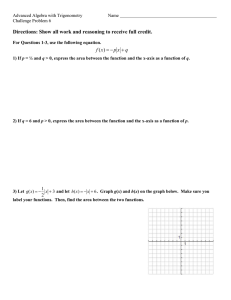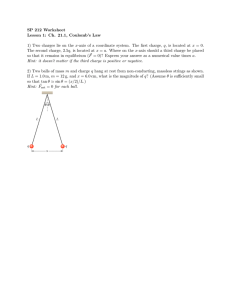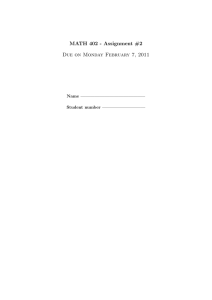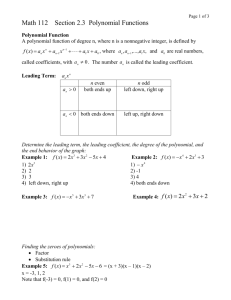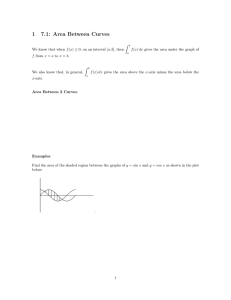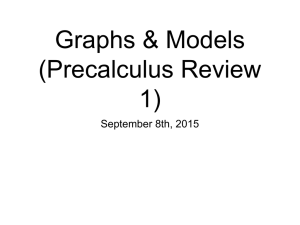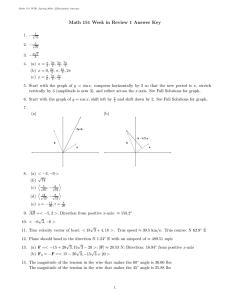Document 11716695
advertisement
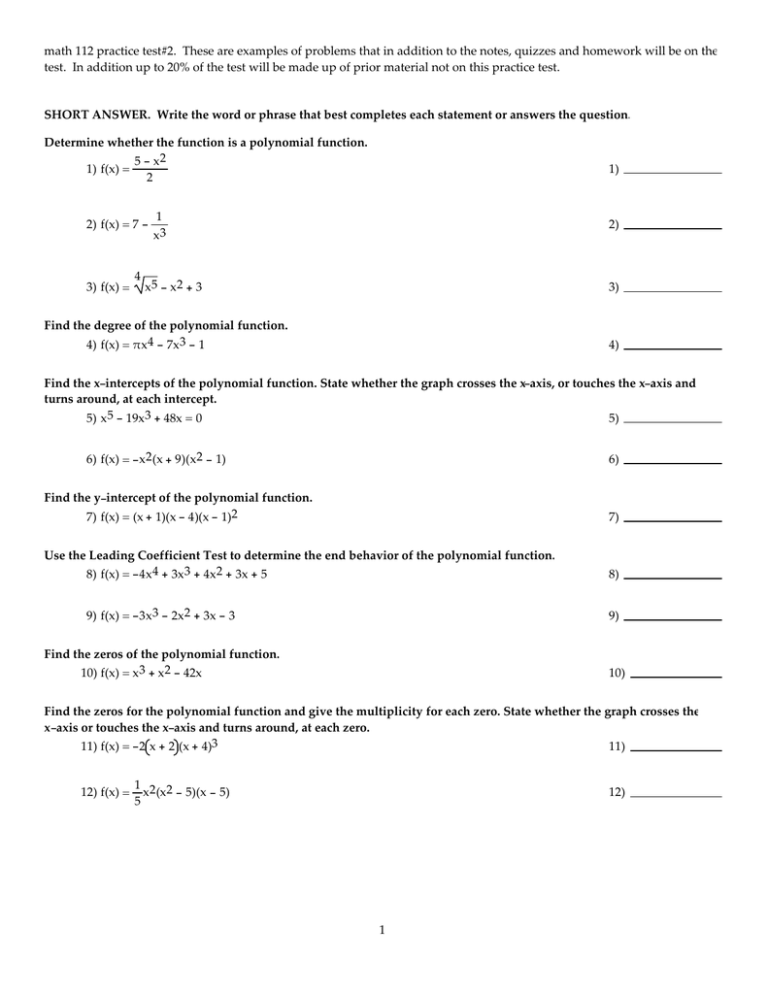
math 112 practice test#2. These are examples of problems that in addition to the notes, quizzes and homework will be on the
test. In addition up to 20% of the test will be made up of prior material not on this practice test.
SHORT ANSWER. Write the word or phrase that best completes each statement or answers the question.
Determine whether the function is a polynomial function.
5 - x2
1) f(x) =
2
2) f(x) = 7 -
3) f(x) =
4
1)
1
x3
2)
x5 - x 2 + 3
3)
Find the degree of the polynomial function.
4) f(x) = πx4 - 7x3 - 1
4)
Find the x-intercepts of the polynomial function. State whether the graph crosses the x-axis, or touches the x-axis and
turns around, at each intercept.
5) x5 - 19x3 + 48x = 0
5)
6) f(x) = -x2 (x + 9)(x2 - 1)
6)
Find the y-intercept of the polynomial function.
7) f(x) = (x + 1)(x - 4)(x - 1)2
7)
Use the Leading Coefficient Test to determine the end behavior of the polynomial function.
8) f(x) = -4x4 + 3x3 + 4x2 + 3x + 5
8)
9) f(x) = -3x3 - 2x2 + 3x - 3
9)
Find the zeros of the polynomial function.
10) f(x) = x3 + x2 - 42x
10)
Find the zeros for the polynomial function and give the multiplicity for each zero. State whether the graph crosses the
x-axis or touches the x-axis and turns around, at each zero.
11) f(x) = -2 x + 2 (x + 4)3
11)
12) f(x) =
1 2 2
x (x - 5)(x - 5)
5
12)
1
Complete the following:
(a) Use the Leading Coefficient Test to determine the graph's end behavior.
(b) Find the x-intercepts. State whether the graph crosses the x-axis or touches the x-axis and turns around at each
intercept.
(c) Find the y-intercept.
(d) Graph the function.
13) f(x) = x2 (x + 2)
13)
y
x
Divide using long division.
x4 + 16
14)
x-2
14)
15) (3x4 - 5x2 + 15x3 - 25x) ÷ (3x + 15)
15)
Divide using synthetic division.
-3x3 - 15x2 + 21x + 18
16)
x+6
16)
17) (x4 + 1296) ÷ (x - 6)
17)
Use synthetic division and the Remainder Theorem to find the indicated function value.
18) f(x) = 2x3 - 6x2 - 3x + 15; f(-2)
19) f(x) = 6x4 + 5x3 + 6x2 - 5x + 48; f(3)
18)
19)
Write the equation of a polynomial function with the given characteristics. Use a leading coefficient of 1 or -1 and make
the degree of the function as small as possible.
20) Crosses the x-axis at -4, 0, and 2; lies below the x-axis between -4 and 0; lies above the
20)
x-axis between 0 and 2.
2
Graph the polynomial function.
21) f(x) = x4 - 4x2
21)
y
10
8
6
4
2
-10 -8 -6 -4 -2
-2
2
4
6 8 10 x
-4
-6
-8
-10
22) f(x) = x3 + 5x2 - x - 5
22)
y
x
23) f(x) = -2x3(x - 1)2 (x + 1)
23)
y
x
Use the Rational Zero Theorem to list all possible rational zeros for the given function.
24) f(x) = x5 - 4x2 + 6x + 5
25) f(x) = 7x3 - x2 + 3
24)
25)
3
Solve the polynomial equation. In order to obtain the first root, use synthetic division to test the possible rational roots.
26) 4x3 - 23x2 + 26x + 8 = 0
26)
27) x3 - 6x2 + 7x + 2 = 0
27)
28) x4 - 5x3 + 28x2 - 70x - 104 = 0
28)
Find the domain of the rational function.
x+7
29) h(x) =
2
x + 36x
29)
30) h(x) =
x+8
x2 - 4
30)
31) g(x) =
x+9
x2 + 16
31)
Find the vertical asymptotes, if any, of the graph of the rational function.
x
32) h(x) =
x(x - 5)
33) g(x) =
x
2
x - 16
32)
33)
Find the horizontal asymptote, if any, of the graph of the rational function.
10x3
34) h(x) =
5x2 + 1
34)
35) g(x) =
10x2
2x2 + 1
35)
36) f(x) =
8x
2x2 + 1
36)
MULTIPLE CHOICE. Choose the one alternative that best completes the statement or answers the question.
Graph the rational function.
4
37) f(x) =
4x2
x2 - 1
37)
y
10
5
-10
-5
5
10
x
-5
-10
A)
B)
y
-10
y
10
10
5
5
-5
5
10
x
-10
-5
-5
-5
-10
-10
C)
5
10
x
5
10
x
D)
y
y
-10
10
10
5
5
-5
5
10
x
-10
-5
-5
-5
-10
-10
SHORT ANSWER. Write the word or phrase that best completes each statement or answers the question.
Find the slant asymptote, if any, of the graph of the rational function.
6x2
38) f(x) =
9x2 + 5
39) f(x) =
x2 + 7x - 7
x-2
38)
39)
5
Solve the polynomial inequality and graph the solution set on a number line. Express the solution set in interval
notation.
40) x2 + 9x + 18 > 0
40)
-9 -8 -7 -6 -5 -4 -3 -2 -1 0 1 2 3 4 5 6 7 8 9
Approximate the number using a calculator. Round your answer to three decimal places.
41) 4 7
Graph the function by making a table of coordinates.
3 x
42) f(x) =
4
6
41)
42)
y
4
2
-6
-4
-2
2
4
6 x
-2
-4
-6
MULTIPLE CHOICE. Choose the one alternative that best completes the statement or answers the question.
The graph of an exponential function is given. Select the function for the graph from the functions listed.
43)
y
10
5
-10
-5
5
10
x
-5
-10
A) f(x) = 5 x
B) f(x) = 5x + 1
C) f(x) = 5 x - 1
6
D) f(x) = 5 x - 1
43)
SHORT ANSWER. Write the word or phrase that best completes each statement or answers the question.
Graph the function.
44) Use the graph of f(x) = 4 x to obtain the graph of g(x) = 4 x - 4.
6
44)
y
4
2
-6
-4
-2
2
4
6 x
-2
-4
-6
45) Use the graph of f(x) = 3 x to obtain the graph of g(x) = 3 x - 1 + 2.
6
45)
y
4
2
-6
-4
-2
2
4
6 x
-2
-4
-6
Approximate the number using a calculator. Round your answer to three decimal places.
46) e-2.7
Use the compound interest formulas A = P 1 +
46)
r nt
and A = Pert to solve.
n
47) Find the accumulated value of an investment of $6000 at 8% compounded semiannually
for 8 years.
47)
48) Find the accumulated value of an investment of $4000 at 7% compounded continuously for
5 years.
48)
49) Find the accumulated value of an investment of $15,000 at 12% compounded annually for
7 years.
49)
Write the equation in its equivalent exponential form.
50) log x = 2
4
50)
7
Write the equation in its equivalent logarithmic form.
3
51) 343 = 7
51)
Evaluate the expression without using a calculator.
52) log 4
2
53) log
3
52)
3
53)
1
2 4
54)
55) log 1
6
55)
54) log
Graph the function.
56) Use the graph of log x to obtain the graph of f(x) = log (x - 1).
3
3
56)
y
10
5
-10
-5
5
10
x
-5
-10
Graph the functions in the same rectangular coordinate system.
1 x
57) f(x) =
and g(x) = log1/4 x
4
y
6
4
2
-6
-4
-2
2
4
6
x
-2
-4
-6
8
57)
Graph the function.
58) Use the graph of f(x) = ln x to obtain the graph of g(x) = -4 - ln x.
58)
y
5
-5
5
x
-5
Find the domain of the logarithmic function.
59) f(x) = ln (7 - x)
60) f(x) = log
59)
x+7
x-8
60)
Use properties of logarithms to expand the logarithmic expression as much as possible. Where possible, evaluate
logarithmic expressions without using a calculator.
x2
61) log
61)
2 y7
62) log
63) ln
4
8
x-6
x5
62)
ey
63)
Use properties of logarithms to condense the logarithmic expression. Write the expression as a single logarithm whose
coefficient is 1. Where possible, evaluate logarithmic expressions.
1
64) log4 x + log4 y
64)
2
65) ( log q - log r) + 2 log p
a
a
a
65)
Use common logarithms or natural logarithms and a calculator to evaluate to four decimal places
66) log 17
9
67) log
13
80.3
66)
67)
Solve the equation by expressing each side as a power of the same base and then equating exponents.
1
68) 2 (7 - 3x) =
68)
4
9
69) 3 (3x + 6) =
1
27
69)
Solve the exponential equation. Express the solution set in terms of natural logarithms.
70) 8 4x = 3.4
71) 4 x + 4 = 5 2x + 5
70)
71)
Solve the exponential equation. Use a calculator to obtain a decimal approximation, correct to two decimal places, for the
solution.
72) e4x - 5 - 2 = 1182
72)
73) 3 x + 7 = 6
73)
Solve the logarithmic equation. Be sure to reject any value that is not in the domain of the original logarithmic
expressions. Give the exact answer.
74) 4 + 8 ln x = 8
74)
75) log (x2 - 8x) = 1
9
75)
76) log5 (x + 5) - log5 (x - 3) = 1
76)
77) log (5x - 5) = log (3x + 7)
6
6
77)
78) log (x + 3) = 4 + log (x - 2)
2
2
78)
79) ln (x - 6) + ln (x + 1) = ln (x - 15)
79)
80) The population of a certain country is growing at a rate of 1.8% per year. How long will it
ln 2
take for this country's population to double? Use the formula t =
, which gives the
k
80)
Solve.
time, t, for a population with growth rate k, to double. (Round to the nearest whole year.)
81) A fossilized leaf contains 15% of its normal amount of carbon 14. How old is the fossil (to
the nearest year)? Use 5600 years as the half-life of carbon 14.
81)
Solve the exponential equation. Use a calculator to obtain a decimal approximation, correct to two decimal places, for the
solution.
82) 10x = 3.19
82)
10
Answer Key
Testname: PRACTICE TEST 112 #2
1)
2)
3)
4)
Yes
No
No
4
18) -19
19) 708
20) f(x) = -x3 - 2x2 + 8x
21)
5) 0, crosses the x-axis;
4, crosses the x-axis;
-4, crosses the x-axis;
3, crosses the x-axis;
- 3, crosses the x-axis
6) 0, touches the x-axis and turns around;
-9, crosses the x-axis;
-1, crosses the x-axis;
1, crosses the x-axis
7) -4
8) falls to the left and falls to the right
9) rises to the left and falls to the right
10) x = 0, x = - 7, x = 6
11) - 2, multiplicity 1, crosses x-axis; -4, multiplicity 3,
crosses x-axis
12) 0, multiplicity 2, touches x-axis and turns around;
5, multiplicity 1, crosses x-axis;
5, multiplicity 1, crosses x-axis;
- 5, multiplicity 1, crosses x-axis
13) (a) falls to the left and rises to the right
(b) x-intercepts: (0, 0), touches x-axis and turns; (-2,
0), crosses x-axis
(c) y-intercept: (0, 0)
(d)
6
16
12
8
4
-8
-6
-4
-2
4
6
-16
-20
y
100
80
60
40
20
-10 -8
-6
-4
-2
-20
2
4
6
2
3
4x
-40
-60
-80
y
-100
22)
23)
y
3
160
2
120
(0, 0)
-5 -4 -3 -2 -1
-1
1
80
2
3
4
5
x
40
-2
-4
-3
-3
-2
-4
-1
-40
1
-80
-5
-120
-6
14) x3 + 2x2 + 4x + 8 +
-160
32
x-2
5
15) x3 - x
3
24) ± 1, ± 5
1
3
25) ± , ± , ± 1, ± 3
7
7
16) -3x2 + 3x + 3
26) -
17) x3 + 6x2 + 36x + 216 +
x
8
-12
4
1
2
-4
-8
5
(-2, 0)
y
20
2592
x-6
1
, 2, 4
4
27) {2, 2 +
11
5, 2 -
5}
8
10 x
Answer Key
Testname: PRACTICE TEST 112 #2
28) {-1, 4, 1 + 5i, 1 - 5i}
29) {x|x ≠ 0, x ≠ -36}
30) {x|x ≠ -2, x ≠ 2}
31) all real numbers
32) x = 0 and x = 5
33) x = 4, x = -4
34) no horizontal asymptote
35) y = 5
36) y = 0
37) C
38) no slant asymptote
39) y = x + 9
40) (-∞, -6) ∪ (-3, ∞)
45)
6
4
2
-6
2
4
6 x
-6
46) 0.067
47) $11,237.89
48) $5676.27
49) $33,160.22
50) 4 2 = x
y
51) log
4
343
7=
1
3
52) 2
1
53)
2
2
-4
-2
-4
41) 39.165
42)
-6
-4
-2
-9 -8 -7 -6 -5 -4 -3 -2 -1 0 1 2 3 4 5 6 7 8 9
6
y
-2
2
4
54) -2
55) 0
56)
6 x
-2
-4
y
10
-6
43) D
44)
5
6
y
-10
-5
5
4
-5
2
-10
-6
-4
-2
2
4
6 x
-2
-4
-6
12
10
x
Answer Key
Testname: PRACTICE TEST 112 #2
57)
76) {5}
77) 6
7
78)
3
y
6
4
79) ∅
80) 39 years
81) 15,299
82) 0.5
2
-6
-4
-2
2
4
6
x
5
x
-2
-4
-6
58)
y
5
-5
-5
59) (-∞, 7)
60) (-∞, -7) ∪ (8, ∞)
61) 2 log x - 7 log y
2
2
62) log (x - 6) - 5 log x
4
4
1
1
63) ln y +
8
8
64) log4 y x
65) log
a
qp2
r
66) 1.2895
67) 1.7099
68) {3}
69) {-3}
ln 3.4
70)
4 ln 8
71)
5 ln 5 - 4 ln 4
ln 4 - 2 ln 5
72) 3.02
73) -5.37
74) e 1/2
75) {9, -1}
13
